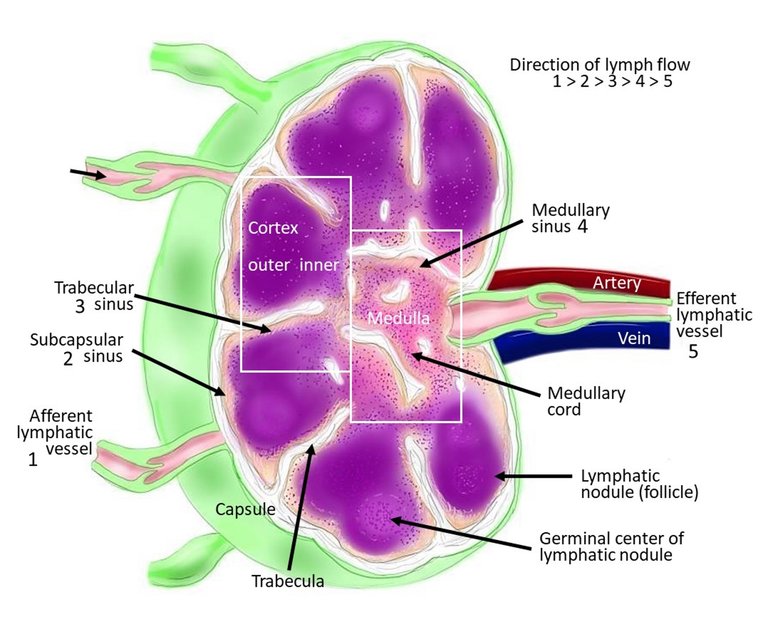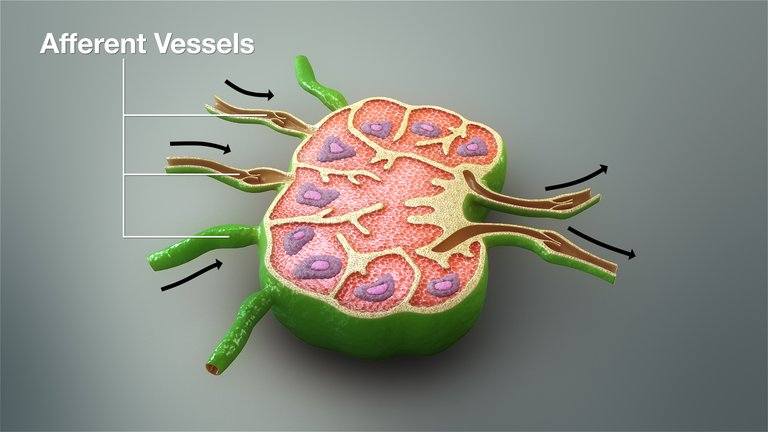Lymph, lymph node and not experiencing swelling in the muscles and tissues have one thing in common, which is the lymphatic system. The job the lymphatic system is spans beyond the body defense, it has an important role to play in maintaining food and water balance in the body. This means that without the lymphatic system, the tissues will swell and we will look like a marshmallow.
In the University, I always join to play the NUGA games which is meant for Public Universities in the country. In one of those matches we played, I injured my ankle and it was swollen. This was as a result of inflammation and some vessels being damaged but then the swelling reduced and I was back on my feet. In that process, the Lymphatic System had a role to play, and we will discuss it as we continue.
Made up of the lymph which originally comes from the blood, the lymphatic vessel which transport the lymph throughout the body, the lymphatic tissues and organs, and the red bone marrows; the job is to defend and to perform homeostasis. The lymphatic system helps in draining excess interstitial fluid.
Provided you are still alive just like I am, and your heart functions properly, it i the job of the heart to pumps blood to every tissue, and it does this by sending blood through the Aorta to the arteries which then begin to branch to smaller arteries then arterioles where it is then sent into blood capillaries where there exchanges of nutrients, blood, and waste products like carbon dioxide and lactate from lactic acid.
Oxygen from the capillary gets into the interstitial space after which they move into the cells and this is just the same way carbon dioxide moves from the cell to the interstitial fluid and back into the blood capillary which sends the blood to the venule, then into a larger vein, and back to the heart. In other to release the carbon dioxide, the blood goes to the lungs where it is exhaled and oxygen is inhaled.
In the interstitial space, some plasma will also leak out of the blood capillary and into the space and this is how cells water but then there must be a way to maintain how the water stays and gets out of the cells, the blood plasma and the interstitial space. So there must be equal amount of fluid entering and leaving the interstitial space so that tissues will not swell and this is where the lymphatic system comes in.
When there is excess fluid in our interstitial space, the lymphatic capillaries start to drain the fluid from the space. The capillaries send the fluid to the lymphatic veins after which they are sent to the lymphatic duct and then they send it back to the blood. This connection to the blood is done at the junction of the jugular and subclavian vein which is found in our neck.
If this doesn't work, people will experience edema as a result of interstitial fluids staying in the space. On average, about 3 liters of fluid is returned back to the bloodstream which are fluids that could have led to swelling in the body. When we are stationary, the lymphatic vessels aren't draining fluid effectively and this is because most of the lymphatic flow rely on muscle contraction and this is emphatic in the lymphatic vessels in the lower part of the body like the lower limbs. So activities like running and walking help to contract the muscles of the lower limb.
In the case where the lymphatic vessels carry foreign particles, then the lymph node does its action. We have about 600 to 700 lymph nodes which are are concentrated in the neck, the abdomen, the armpit, and groins. When the lymph find their way to the lymph nodes, they meet white blood cells such as macrophages, T cells and B cells. When the lymph node swells in a case of Lymphadenopathy, then it is as a result of the white blood cells in the lymph node doing their job of fighting of pathogens and foreign body and once they have been able to control it, the swelling reduces.
Like I mentioned in the beginning that the lymphatic system does the job of preventing edema, as well as a body defense against pathogens and foreign bodies. There was a time my sister had a swelling in her armpit and I jokingly told her that it was her lymph node that was swollen. It might look like a joke at the time but I might be right. I used the word "might" because I didn't ask her how the visit to the doctor was.
Reference.
https://www.cancer.gov/publications/dictionaries/cancer-terms/def/lymphatic-system
https://my.clevelandclinic.org/health/body/21199-lymphatic-system
https://www.ncbi.nlm.nih.gov/books/NBK513247/
https://www.cancer.gov/publications/dictionaries/cancer-terms/def/lymph-vessel
https://pmc.ncbi.nlm.nih.gov/articles/PMC6459625/
https://www.sciencedirect.com/topics/immunology-and-microbiology/lymph-vessel




